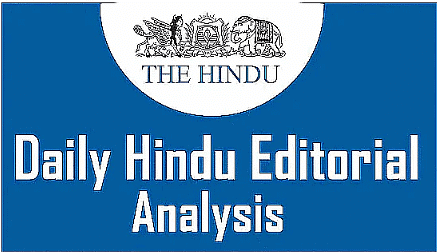UPSC Exam > UPSC Notes > Current Affairs & Hindu Analysis: Daily, Weekly & Monthly > The Hindu Editorial Analysis- 22nd December 2023
The Hindu Editorial Analysis- 22nd December 2023 | Current Affairs & Hindu Analysis: Daily, Weekly & Monthly - UPSC PDF Download

Questionable searches under the Money Laundering Act
Why in News?
The enforcement of the Prevention of Money Laundering Act, 2002 (passed in the background of India’s commitment to the international community to fight the drug menace and terrorism) has caused much consternation especially after its unusual interpretation by the Supreme Court of India in Vijay Madanlal Choudhary and Ors vs Union of India and Ors. (2022).
What is the Prevention of Money Laundering Act (PMLA), 2002?
- Money Laundering refers to the conversion or misrepresentation of money which has been illegally obtained by unlawful sources and methods.
- It is a criminal offence in India and charges in this instance refer to statutory provisions of the Prevention of Money Laundering Act, 2002.
- The PMLA was enacted in response to India’s global commitment ( Vienna Convention) to combat the menace of money laundering. These include:
- United Nations Convention Against Illicit Traffic in Narcotic Drugs and Psychotropic Substances 1988
- Basle Statement of Principles, 1989
- Forty Recommendations of the Financial Action Task Force on Money Laundering, 1990
- Political Declaration and Global Program of Action adopted by the United Nations General Assembly in 1990
- The PMLA is applicable to all persons which include individuals, companies, firms, partnership firms, associations of persons or incorporations and any agency, office or branch owned or controlled by any of the above-mentioned persons.
What are the Recent Amendments in PMLA?
- Clarification about the Position of Proceeds of Crime: Proceeds of the Crime not only includes the property derived from scheduled offence but would also include any other property derived or obtained indulging into any criminal activity relate-able or similar to the scheduled offence.
- Money Laundering Redefined: Money Laundering was not an independent crime rather depended on another crime, known as the predicate offence or scheduled offence.
- The amendment seeks to treat money laundering as a stand-alone crime.
- Under Section 3 of PMLA, the person shall be accused of money laundering if in any manner that person is directly or indirectly involved in the proceeds of the crime.
- Concealment
- Possession
- Acquisition
- Use or projecting as untainted property
- Claiming as untainted property
- Continuing Nature of Offence: This amendment further mentioned that the person will be considered to be involved in the offence of money laundering till the time that person is getting the fruits of activities related to money laundering as this offence is of a continuing nature.
What are the Concerns Raised About the Amendments in PMLA?
- Possible Misuse of Powers: There is a strong possibility that PMLA can be invoked against a political rival or a dissenter, because the “process is itself the punishment”.
- Issues with ECIR: ECIR (Enforcement Case Information Report), an equivalent of the FIR, is considered an “internal document” and not given to the accused.
- Throughout the procedure, the accused does not even know facts of the allegation against him, as the only document which contains the allegation is the ECIR, which is not supplied to the accused persons.
- Contrast to General Criminal Law: PMLA is different from the General Criminal Law.
- In General Criminal Law, every accused is innocent until proven guilty.
- However, in PMLA, this burden has been shifted to the accused persons; they will have to prove their innocence.
- Accused-Bound to be a Witness: Section 63 of PMLA states that information must be given by the accused, false information or no information will constitute another offence.
- Compelling the accused to be a witness against themselves is violative of the right against self-incrimination.
- Inefficiency of ED: The conviction rate of Enforcement Directorate under this law is very low, despite thousands of cases registered, people arrested, and lives turned upside down.
- According to the data quoted by the government in Parliament of India, there were zero convictions between 2005 and 2013-14. By 2014-15 to 2021-22, out of 888 cases under ED, only 23 cases were under conviction.
What Should be the Way Forward?
- Internal Checks and Balances: It is true that law has given stringent powers to the ED in dealing with the accused that can increase the possibility of political misuse.
- But there must be a consensus between the adjudicating authority and the officers of ED to abide by the constitutionality of provision under PMLA, making the investigation more lucid.
- The Process Itself Should not Become Punishment: The ED's expanded powers should be welcomed with a greater commitment to expeditiously resolve the cases, so both the judiciary and enforcement agencies can move forward with speedy trials and convictions.
- Operational Vigilance: There must be a constant scrutiny over the operations of the Enforcement Directorate and current disposition whether this clarification will improve the conviction rate (which is right now less than half a percent).
- And if there will be any lacunas in the operative part, change is the law of nature, these gaps can be filled either through suitable legislation, executive action or revised order of the apex court.
The document The Hindu Editorial Analysis- 22nd December 2023 | Current Affairs & Hindu Analysis: Daily, Weekly & Monthly - UPSC is a part of the UPSC Course Current Affairs & Hindu Analysis: Daily, Weekly & Monthly.
All you need of UPSC at this link: UPSC
|
57 videos|5393 docs|1142 tests
|
Related Searches





















